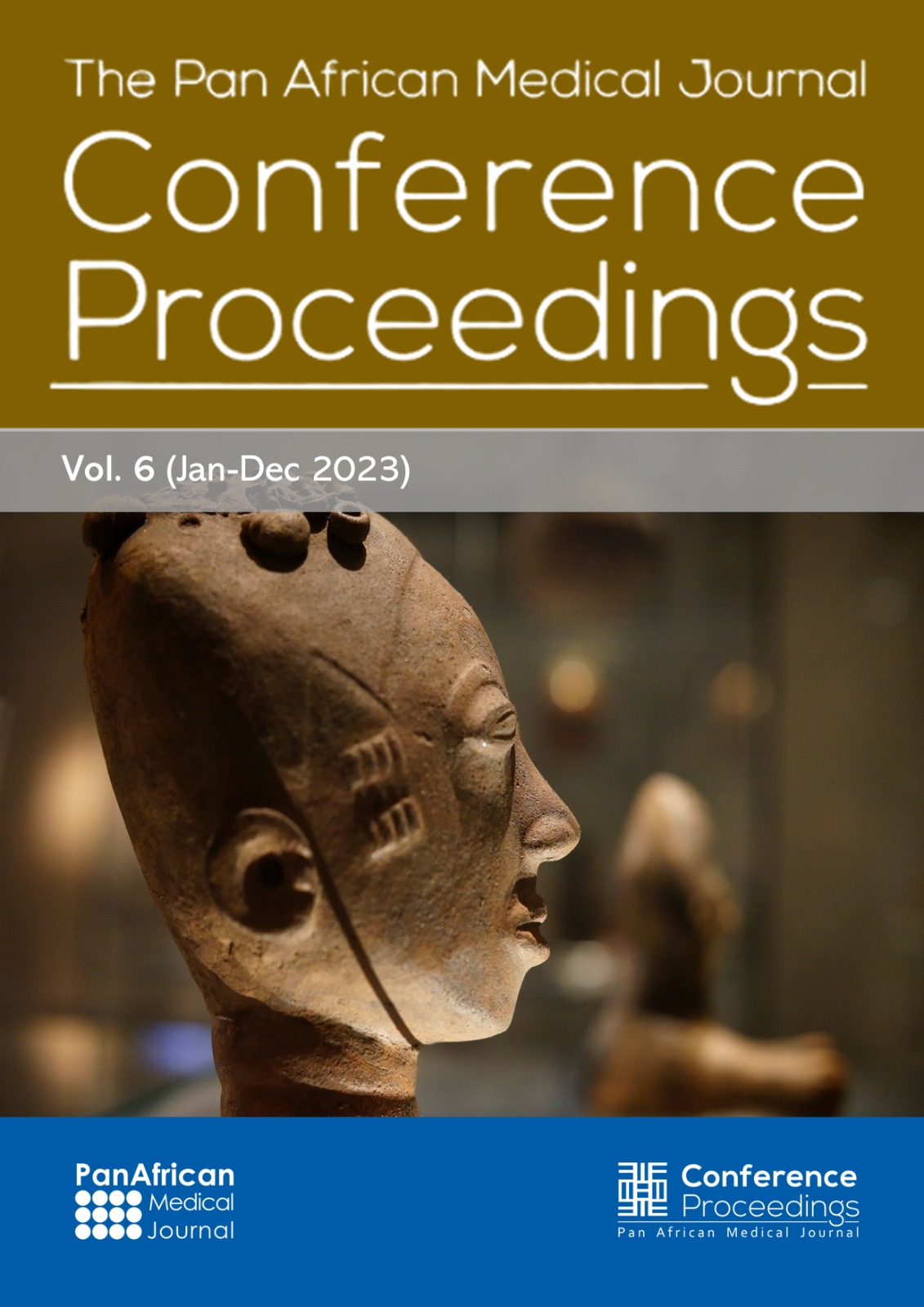Conference abstract
Acute effects of low-dose Stevia rebaudiana Bertoni extracts on the response to a meal test in type 2 diabetes mellitus patients
Pan African Medical Journal - Conference Proceedings. 2017:2(18).31
Aug 2017.
doi: 10.11604/pamj-cp.2017.2.18.48
Archived on: 31 Aug 2017
Contact the corresponding author
Keywords: Steviosides, extracts, insulin secretion, type 2 diabetes mellitus
Oral presentation
Untitled Document
Acute effects of low-dose Stevia rebaudiana Bertoni extracts on the response to a meal test in type 2 diabetes mellitus patients
Mireille Claudia Bokam Abeng1,&, Jean-Claude Njabou Katte2, Hélène Ornella Ondoa Bongha1, Raicha Namba1, Jean Claude Nganou Mbanya3,Eugene Sobngwi3
1Department of Internal Medicine, Faculty of Medicine and Biomedical Sciences, University of Yaoundé 1, Cameroon, 2Department of public health, Faculty of Medicine and Biomedical Sciences, University of Yaoundé 1, Cameroon, 33. National Obesity Center, Yaoundé Central Hospital and Department of Internal Medicine, Faculty of Medicine and Biomedical Sciences, University of Yaoundé 1, Yaoundé, Cameroon
&Corresponding author
Mireille Claudia Bokam Abeng, Department of Internal Medicine, Faculty of Medicine and Biomedical Sciences, University of Yaoundé 1, Cameroon
Introduction:
steviosides (Steviol glycoside and Rebaudioside A) are non-caloric, natural sweeteners from the plant Stevia rebaudiana with potential metabolic benefits beyond its sweetness. We aimed to assess low-dose effect of Rebaudioside A on glucose metabolism in type 2 diabetic (T2DM) patients.
Methods:
we carried out an experimental study at the National Obesity Centre of the
Yaoundé Central Hospital on T2DM patients with satisfactory metabolic control.
They underwent in a fasting state, 48 hours apart, in a random order a standard
mixed meal tolerance test containing 54g of carbohydrates, 20g of lipids and
26g of proteins for a total of 410 kcal,with or without addition of 240 mg of
Rebaudioside A. Glucose and C peptide concentrations were measured at baseline
and at 30, 60, 90 and 120 min after ingestion of the test meal.
Results:
sixteen patients (10 males and 6 females) aged 59 [50.5-60.5] years, with
3.5 [3.6-5.0] years duration of diabetes and HbA1c of 42.0 [37.5-49.3] mmol/molparticipated
in the study. The glycemic response to the mixed meal test without Stevia
and with Stevia was [5,6 (5,2-6,6) mmol/l vs 5,5(5,2-6,5) mmol/l; p = 0,8]
at T0,
[6,1(5,6-6,8) mmol/l vs 5,7(5,3-6,5) mmol/l; p = 0,01]. The C-peptide variations
during the mixed meal test without Stevia and with Stevia was 0,03 [0,03-0,06]nmol/l
vs 0,06 [0,05-0,1]nmol/l at T0 (p = 0.02), 0,05 [0,04-0,07]nmol/l vs 0,08
[0,06-0,1]nmol/l, (p = 0.21) at T30 and 0,06 [0,04-0,07]nmol/l vs 0,07
[0,06-0,09]nmol/l, (p = 0.20) at T120 with a non-significant decrease of
the AUC by 32% (6,3 [5,7-7,3]
nmol/l/120 min vs 9,3 [7,1-12,1] nmol/l/120 min, p = 0.19).
Conclusion:
low-dose stevioside reduced blood glucose response to a mixed meal tolerance test in well controlled T2DM patients, with a non-significant increase in insulin secretory response and may prove metabolic benefits in addition to its sweetening effect.
Acute effects of low-dose Stevia rebaudiana Bertoni extracts on the response to a meal test in type 2 diabetes mellitus patients
Mireille Claudia Bokam Abeng1,&, Jean-Claude Njabou Katte2, Hélène Ornella Ondoa Bongha1, Raicha Namba1, Jean Claude Nganou Mbanya3,Eugene Sobngwi3
1Department of Internal Medicine, Faculty of Medicine and Biomedical Sciences, University of Yaoundé 1, Cameroon, 2Department of public health, Faculty of Medicine and Biomedical Sciences, University of Yaoundé 1, Cameroon, 33. National Obesity Center, Yaoundé Central Hospital and Department of Internal Medicine, Faculty of Medicine and Biomedical Sciences, University of Yaoundé 1, Yaoundé, Cameroon
&Corresponding author
Mireille Claudia Bokam Abeng, Department of Internal Medicine, Faculty of Medicine and Biomedical Sciences, University of Yaoundé 1, Cameroon
Introduction: steviosides (Steviol glycoside and Rebaudioside A) are non-caloric, natural sweeteners from the plant Stevia rebaudiana with potential metabolic benefits beyond its sweetness. We aimed to assess low-dose effect of Rebaudioside A on glucose metabolism in type 2 diabetic (T2DM) patients.
Methods: we carried out an experimental study at the National Obesity Centre of the Yaoundé Central Hospital on T2DM patients with satisfactory metabolic control. They underwent in a fasting state, 48 hours apart, in a random order a standard mixed meal tolerance test containing 54g of carbohydrates, 20g of lipids and 26g of proteins for a total of 410 kcal,with or without addition of 240 mg of Rebaudioside A. Glucose and C peptide concentrations were measured at baseline and at 30, 60, 90 and 120 min after ingestion of the test meal.
Results: sixteen patients (10 males and 6 females) aged 59 [50.5-60.5] years, with 3.5 [3.6-5.0] years duration of diabetes and HbA1c of 42.0 [37.5-49.3] mmol/molparticipated in the study. The glycemic response to the mixed meal test without Stevia and with Stevia was [5,6 (5,2-6,6) mmol/l vs 5,5(5,2-6,5) mmol/l; p = 0,8] at T0, [6,1(5,6-6,8) mmol/l vs 5,7(5,3-6,5) mmol/l; p = 0,01]. The C-peptide variations during the mixed meal test without Stevia and with Stevia was 0,03 [0,03-0,06]nmol/l vs 0,06 [0,05-0,1]nmol/l at T0 (p = 0.02), 0,05 [0,04-0,07]nmol/l vs 0,08 [0,06-0,1]nmol/l, (p = 0.21) at T30 and 0,06 [0,04-0,07]nmol/l vs 0,07 [0,06-0,09]nmol/l, (p = 0.20) at T120 with a non-significant decrease of the AUC by 32% (6,3 [5,7-7,3] nmol/l/120 min vs 9,3 [7,1-12,1] nmol/l/120 min, p = 0.19).
Conclusion: low-dose stevioside reduced blood glucose response to a mixed meal tolerance test in well controlled T2DM patients, with a non-significant increase in insulin secretory response and may prove metabolic benefits in addition to its sweetening effect.








